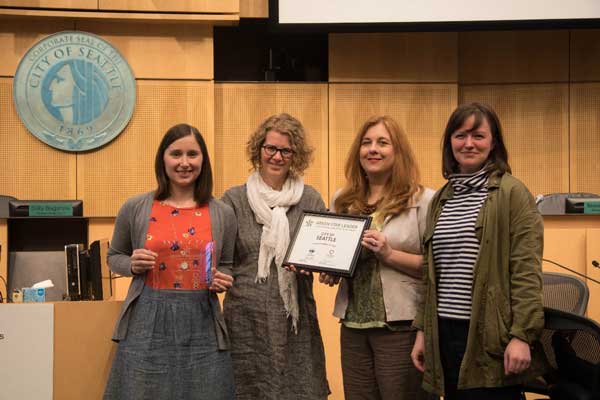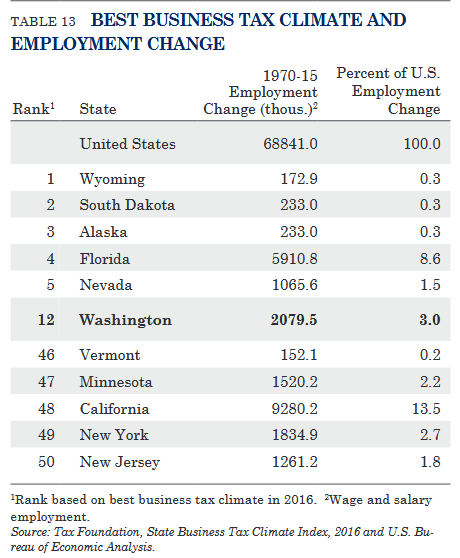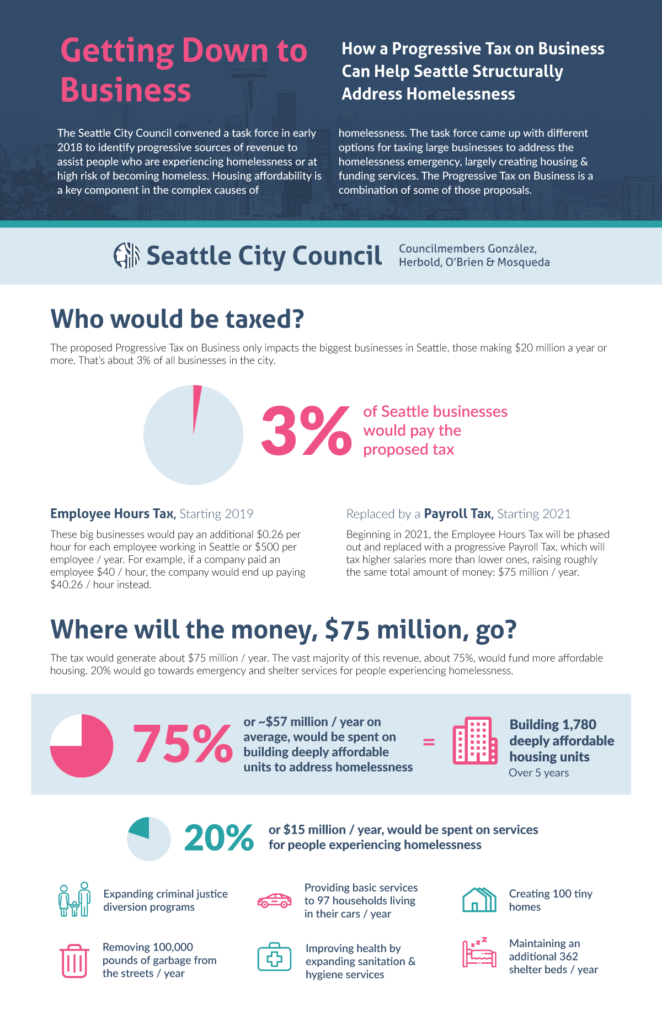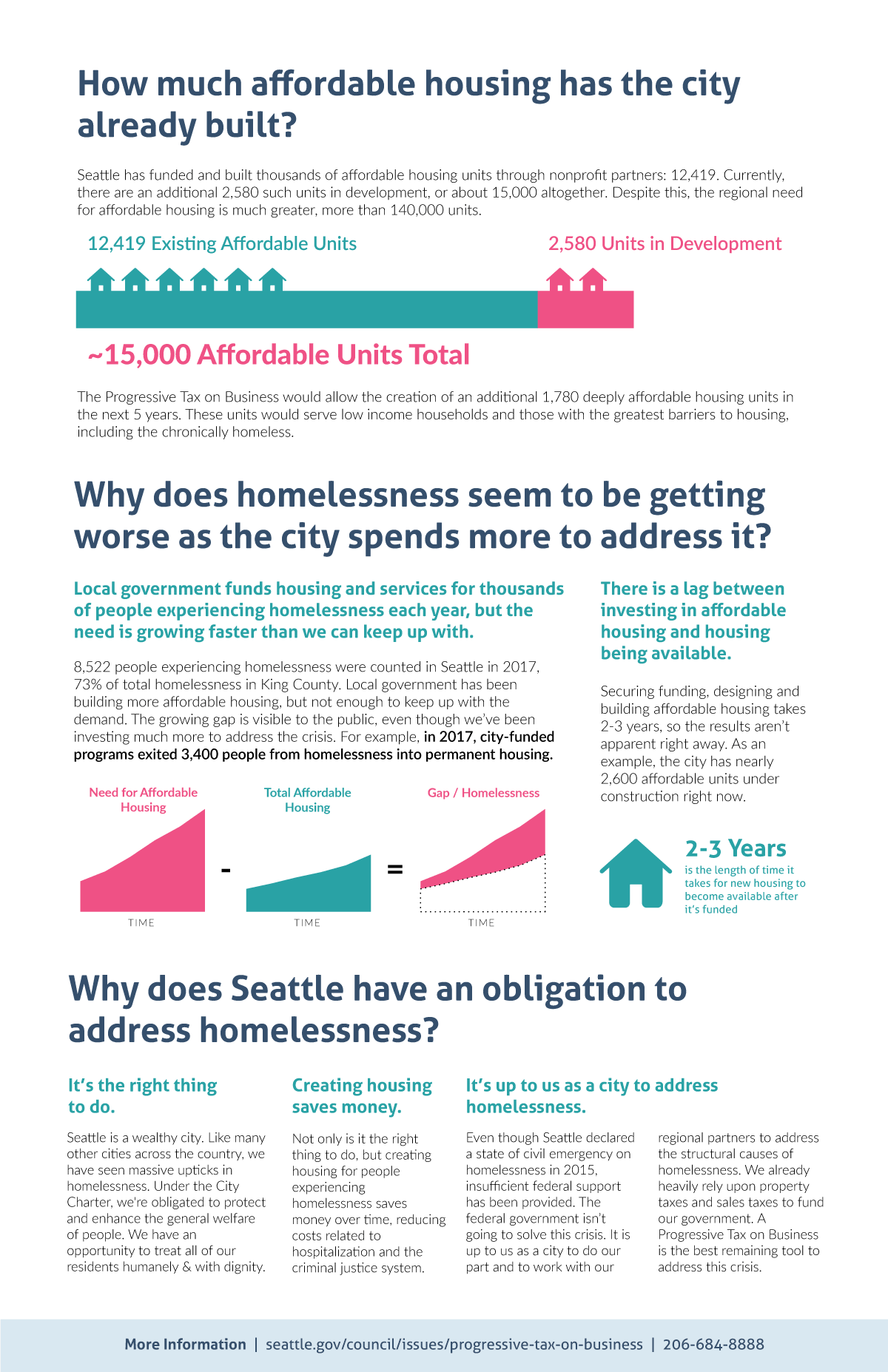Nature’s Scorecard; Update: Progressive Tax on Big Business; In-District Office Hours Update
Nature’s Scorecard
On Tuesday, the Puget Soundkeeper and the Washington Environmental Council provided my committee a briefing on their joint project, Nature’s Scorecard. Under the Clean Water Act cities are required to manage stormwater runoff and ensure that combined sewer overflows occur no more than once per outfall per year. Nature’s Scorecard is an easily digestible snapshot of how municipalities in the Puget Sound are performing in updating their development codes in order to meet these requirements. Specifically, the Puget Soundkeeper and the Washington Environmental Council are tracking the implementation of low-impact development (LID), which utilizes natural drainage solutions to prevent stormwater from directly entering our waterways.
Nature’s Scorecard uses five categories to track and rank the progress municipalities are making. These categories are: Softening our Footprint, Building with Care, Improving Filtration, Growing the Right Trees, and Maintaining Buffers.
Seattle ranked very highly making progress in all five areas. Additionally, Seattle along with eight other cities, was awarded a Green Star award for going above and beyond the permit requirements. However, over 50% of municipalities in the Puget Sound failed to make necessary updates to their code. You can view the full scorecard here.
Progressive Tax and Big Business
On Friday April 20, Councilmembers González, O’Brien, and Mosqueda, and myself released the proposed Council Bill necessary to implement the Progressive Tax on Big Business and proposed resolution to impose a spending plan for the use of those revenues once collected.
You can find here: the proposed Council Bill to implement the tax, a proposed spending plan resolution, a proposed spending plan, an outline of the system-wide performance standards for homelessness service investments, and detailed information on affordable housing inventory and services.
Over the past several months I have written updates about the efforts of the Progressive Revenue Task Force and the process that led to the release of this proposed legislation. For a more thorough background on the Progressive Revenue Task Force please see my previous blog posts on this issue:
Prior to the release of the proposed Council Bill and companion resolution, we met with Mayor Durkan’s Small Business Advisory Committee, we have held a business roundtable, had several Council discussions in Councilmember Bagshaw’s Finance and Neighborhoods Committee. Since the release of the legislation we have had a public hearing and Councilmember González and I have met with neighborhood business chambers and will continue those meetings throughout the City.
Proposed Tax Ordinance
As proposed, the tax would only apply to business with $20 million or more in Seattle gross receipts and would only apply to the top 3% of Seattle businesses. Under this proposal those businesses would pay $500 per employee per year or roughly $.25 per employee per hour. As proposed by the task force, this tax would raise $75 million per year to address the city’s homelessness crisis.
Beginning in 2021, the Employee Hours Tax (EHT) would be phased out and be replaced with a progressive payroll tax. We have heard from many businesses that a payroll tax would be preferable because it recognizes that some high grossing businesses, due to high labor costs, have a very narrow profit margin. It would be my preference to implement the payroll tax as soon as possible. We have heard from the Office of Finance and Administrative Services that they will need up to 2 years to create the infrastructure necessary to implement a payroll tax.
I have heard concerns about how this tax would impact small businesses and not for profit organizations. By raising the threshold from the $10 million dollars proposed by the task force to $20 million dollar we will exempt small businesses and many medium-sized businesses from paying the tax. As stated above, 97% of Seattle businesses would be exempt from the proposed tax. Additionally, the base legislation exempts all non-profit, 501C3, organizations.
I’ve also heard concerns about the local economy; recent studies provide insight into this.
Much of Seattle’s recent growth has been in the tech sector. A study by local economist Dick Conway, Washington State and Local Tax System: Dysfunction and Reform, notes that while this creates additional jobs, the practical effect is to shift the tax burden to those least able to bear that burden, due to our regressive tax system:
“high-tech job creates two or three other jobs in the economy through the multiplier process. These workers and their families place demands on the public sector for schools, roads, and safety. If the added costs of these public goods and services were to fall disproportionately on low and middle-income households, as they do now under Washington’s sales-based tax system, those households would in effect be subsidizing the high-tech companies and their employees”.
The structural cause of homelessness in high cost cities like Seattle is that there is a growing unmet need for more affordable housing created when new workers, earning new high wage jobs, and low-income workers are in competition for limited housing. Lower income workers lose out and the result is that the explosive growth and rising rents that Seattle is experiencing has increased homelessness even as we, each year, exit more than 3,000 people out of homelessness and into permanent housing. A progressive tax on businesses most benefiting from this growth is our best option because we already rely heavily upon regressive property and sales taxes that hit everyone equally. Homelessness is a regional problem and one that extends beyond our City’s limits. As our partners in combating a crisis, we look forward to the regional One Table’s recommendations and fully expect the County and others to engage in addressing this massively increasing, too.
It’s important to note that in its latest study, the Tax Foundation concludes that, among the fifty states, Wyoming has the best business tax climate. Yet, as this report notes (page 26), “Despite having the best business tax climate, there is no evidence that it has done the Wyoming economy much good. Between 1970 and 2015, Wyoming added only 172,900 jobs, 0.3 percent of the total gain in U.S. employment. There is in fact no correlation (0.011) between a state’s business tax climate and its ability to generate jobs, as a simple statistical test reveals (see “Business Tax Climate Spreadsheet”). Illustrating the lack of correlation, with the third worst business tax climate, California created on net 9,280,200 payroll jobs—more than one out of every eight new jobs in the nation—between 1970 and 2015.” (see Table 13).
Two recent studies attest to the health of the local economy, ranking Washington State first in the nation. A 2017 study listed Washington State as having the best economy in the country. In the three key measures used in the study’s methodology ranked first in Economic Activity, third in Innovation Potential, and fourth in Economic Health. A graphic shows the top and bottom-ranked states. Washington State leads the nation in personal income growth, in a report by the Bureau of Economic Analysis of the US Commerce Department, with an increase of 4.8% during 2017.
Spending Plan and Resolution
As currently proposed, seventy-five percent of the revenue generated by the tax would be spent on development of affordable housing, 20% would be spent on emergency services, shelter, and hygiene services and 5% would go to the administrative costs of administering the tax. In total, this revenue would allow us to create 1,780 new affordable housing units over the next 5 years. See the chart below for a breakdown of those units. This is of course in addition to the low income housing units produced every year under the 2017 Housing Levy, about 2,150 units over 7 years, for a total of 3,930 units of low income housing for our city’s residents that need it most.
Twenty percent of the revenue would be sent on emergency shelter and services such as expanding criminal justice diversion programs, providing basic services to 97 households living in their cars (per year), providing and maintaining an additional 362 shelter beds a year and removing 100,000 pounds of garbage, garbage that impacts local businesses, from encampment locations and surrounding Seattle streets each year.
In a recent announcement, Councilmember González, chair of the Gender Equity, Safe Communities, New Americans and Education Committee said: “In 2017, our city-funded programs exited 3,400 people from homelessness into permanent housing. Yet, we continue to see people living and sleeping in public spaces. The causes for homelessness are varied but the result is the same: unsheltered people are unable to find their way into affordable housing because it does not exist at the needed scale. The answer to our homelessness crisis is not as simple as being austere and shuffling existing budget priorities. There is no question that additional resources are needed to fund housing and services that are working. This new revenue is targeted towards building deeply affordable housing and funding services that allow a person to become healthy, stable and independent.”
Next Steps
I know many people have asked that the CIty provide a fuller picture of where our current investments in homelessness services are being made and what the outcomes have been. Next week, I’ll share a report from the city’s Human Services Department on this topic.
This issue will be before the Seattle City Council again on Wednesday May 2nd at 12pm in Council Chambers. At this meeting Councilmembers will participate in “issue identification” which is an opportunity for Councilmembers to signal their interest in potential amendments to the proposed Council Bill and Resolution, as well as the spending plan. On Wednesday May 9th the Finance and Neighborhood committee will meet to discuss and vote on possible amendments to the legislation. The Council anticipates the vote on the tax bill and companion resolution at Full Council on Monday May 14th
You can learn more about where the council is in the process and the proposed legislation at the City Council’s Progressive Tax on Business webpage.
In-District Office Hours
My next scheduled office hours are Friday, May 25 at the Senior Center of West Seattle (417 SW Oregon St). Please contact my scheduler Alex Clardy (alex.clardy@seattle.gov) if you would like to setup a time to meet then. My apologies for any inconvenience and I hope everyone is enjoying the fantastic weather!
- Friday, May 25, 2018
Senior Center of West Seattle, 4217 SW Oregon St - Friday, June 15, 2018
South Park Community Center, 8319 8th Avenue S - Friday, July 27, 2018
Southwest Neighborhood Service Center, 2801 SW Thistle St - Friday, August 17, 2018
Senior Center of West Seattle, 4217 SW Oregon St - Friday, September 21, 2018
South Park Community Center, 8319 8th Avenue S - Friday, October 26, 2018
Southwest Neighborhood Service Center, 2801 SW Thistle St - Friday, December 14, 2018
South Park Community Center, 8319 8th Avenue S
Posted: April 27th, 2018 under Councilmember Herbold, Education, Homelessness, Public Health
Tags: Clean Water Act, Green Star, homelessness, Housing, LID, Progressive Tax, Puget Soundkeeper, tax, Tax Foundation








